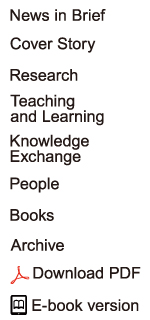Nurturing Research Across The Spectrum
The new Vice-President and Pro-Vice-Chancellor (Research), Professor Andy Hor, asks some pointed questions about what research at HKU should do and how to take it forward.
Professor Andy Hor opens his interview with a blunt statement: “Feel free to ask questions; if I don’t have the answer I will tell you.” But it soon becomes clear he is as interested in asking questions as answering them.
He starts with the holy grail of research itself: publication. Across the academic world, impact has become measured by publications in high-profile journals, the number of times a scholar’s work is cited by others, and other measurable outputs. These things can make or break a career but what, asks Professor Hor, does that have to do with the rest of society?
“You publish so many papers and have 1,000 citations – so what? You have 100 patents on the
shelf – so what? People on the street are going to wonder, what does that mean to me? These are the people, the taxpayers, that fund much of our research, as well as other stakeholders of the University,” he said.
Professor Hor believes it is time for the University to make a greater push towards explicitly addressing the impact of research in the world at large and place this alongside traditional ideas of research, rather than regard the two in isolation.
His vision is of a continuum of knowledge creation, translation and harnessing. At one end is blue-sky research where knowledge is pursued at its root, at the other end is impact where research seeks to address specific problems in society and take on global challenges.
![]() More and more, we will be measured by outcome, not just output, and impact, not just relevance.
More and more, we will be measured by outcome, not just output, and impact, not just relevance. ![]()
Professor Andy Hor
Why impact matters
immediately, benefits society. Professor Hor believes that it is better to focus on the value-chain of the knowledge continuum rather than draw artificial lines between basic and applied research.
“HKU is a comprehensive university and we should value its inherent diversity. The challenge for us is to find the synergy and harness our complementary strengths,” he said.
He would like to see faculties and departments produce statements about what impact means to them as this will likely be important both in terms of funding and relevance to the world we live in. “More funding will come but only if we are truly innovative in our works and we take on global aspirations. The distinctive and distinguishing traits of HKU must be evident to all.
“More and more, we will be measured by outcome, not just output, and impact, not just relevance,” he said. “Impact and outcome take time to crystallise, but we must be serious in embarking on this journey. They may affect the way you look at research, how you run a project, even the research field you enter. We have to think deeply about it and get ready.”
That means not only using research to solve problems, but being creative and innovative in turning challenges into opportunities. He cited emerging challenges in social security, food safety and environmental pollution as examples of areas where HKU should play a leading role.
“Creative and innovative research is not just about solving problems, but staying ahead of the problems. We create new knowledge, some of which provides solutions in tomorrow’s world,” he said. “This is how some Nobel Laureates were incubated.”
Frontline experience
Professor Hor has himself straddled the research-impact continuum. Born and raised in Hong Kong, he pursued a typical academic career track, studying at Imperial College and Oxford and doing postdoctoral work at Yale before arriving at the National University of Singapore in 1984 as a Lecturer and eventually becoming Professor of Chemistry at age 44. But five years ago he did an almost 180-degree turn. He was seconded to the city-state’s Agency for Science, Technology and Research (A*STAR) to be Executive Director of its Institute of Materials Research and Engineering. A*STAR is a mission-oriented research organisation with a clear technological and economic brief.
“I went through a big change in focussing on publications, citations, teaching and services, to a place that every day we talked about how to grow GDP, how to create high-value jobs, and how research can benefit industry, economy and social cause. We had to deal with the grand plans of multi-billion international companies and the on-the-ground problems facing small local enterprises that are struggling to stay afloat. We had to turn ‘mission impossible’ to realities in order to gain the ‘buy-in’ from the public, not just government.
“I learned so much there that I feel I can contribute to HKU, particularly in innovation and entrepreneurship,” he said, adding that the latter was not confined to academic staff but included both undergraduate and postgraduate students, and should be supported by the whole Senior Management Team. It has to be a campus-wide pursuit.
Next


-crop-u4582.jpg)
